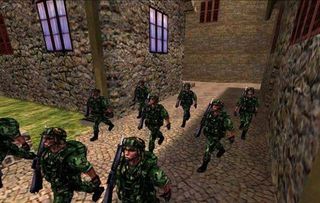Interview: Valve on 13 things they've failed at

Last month I was at Valve HQ in Bellevue to play Portal 2 and interview seven of their key staff. You can read the resulting preview and feature in the current issue of PC Gamer in the UK , and we're also putting an interview up every day for a week here on the blog. Yesterday MD Gabe Newell, project manager Erik Johnson and marketing director Doug Lombardi explained their history of surprising decisions , and teased three more major surprises in the next year. Today, I innocently ask them if there's anything in their history they see as a failure, and get thirteen different responses.

PC Gamer: You said you have to fail to learn something - are there things you think you have failed at?
Gabe Newell: Moss, in the original Half-Life 1 (They once said moss would grow in real-time in Half-Life) . Ricochet , PowerPlay ...
Erik Johnson: The first few months of Steam weren't exactly...
Doug Lombardi: It's hard to say now, but the first two days of Half-Life 2. That was a failure.
Gabe Newell: What else... Prospero, the game that we never shipped.
PC Gamer: That was the game you were developing around the same time as Half-Life, right?
The biggest gaming news, reviews and hardware deals
Keep up to date with the most important stories and the best deals, as picked by the PC Gamer team.
Gabe Newell: Yeah. I mean we still think about it, right?
Erik Johnson: Absolutely. Those products and features that have never seen the light of day, but it's really hard to count those as 'failure' as they all end up somewhere.
Gabe Newell: Well, they're still interesting failures. That's the whole point of failure, right?
Doug Lombardi: The TF2 that was built up until 2000...
Gabe Newell: Our first stab at Blobulator was a failure (I didn't get a chance to follow up on this, but it may be a tool relating to the .blob files Steam uses) . Oh, Invasion was a failure.
Erik Johnson: (Explaining:) The second TF2.
Gabe Newell: Right. The first TF2 was a failure and it was sort of an uninteresting failure.
Erik Johnson: Although that one was interesting, because it was the thing we showed at E3. And at that point, voice communication when the person's mouth moving that was...
Gabe Newell: Rocket science!
Erik Johnson: People were amazed by that, and we shipped that...
Gabe Newell: ...in Counter-Strike.
Erik Johnson: The animation system we shipped...
Gabe Newell: ...in Counter-Strike.
Erik Johnson: Friends and Foes, the original Friends tracker was in it...
Gabe Newell: ...Counter-Strike!
Erik Johnson: But that was totally a failure. And then in the second TF2 was a failure, but there's been a lot of things from that TF2 that are in this TF2.

Gabe Newell: Yeah, you'd like to absorb your failures before they torture your customers.
The Riot Shield, but that was small on a failure scale. That was an interesting failure because that makes us think hard... It's the first time we put a feature in and more people played the game - which is our most basic way of measuring whether or not we're making people happy - and then we took it out and more people played. And we're like, “OK, what does this mean? ” Is it just this sort of meta...
Doug Lombardi: Counter-Strike continues to mystify. (Laughs)
Gabe Newell: Well no, in general it taught us a lot about the value of constantly touching your customers.
Erik Johnson: Right, so our customers are responding to this more like a service than a product! (All laugh) We should build them something to get them software more quickly!
Gabe Newell: Right!
Doug Lombardi: There's a few failed starts to build Left 4 Dead, too. That took a while before it took shape.
Gabe Newell: Well, there was the flying fairy game. Is that the one you were referring to?
Doug Lombardi: (Laughs) Yeah, there were a few iterations, yes.
Erik Johnson: That was just a different game that, when we stabbed it...
Doug Lombardi: ... It turned into Left 4 Dead!
(All laugh)
Gabe Newell: That was a useful failure to us because it was so clearly dumb that it made us say, “OK, what are we actually good at that we can do instead?” It was not optimising for the right thing.
PC Gamer: What was the flying fairy game?
Erik Johnson: That was in RAM! I've already deleted that.
(All laugh)
Gabe Newell: It was a weird prototype game that had spells and was based on movement and mouse gestures. It was so bad, you wanted to ask yourself “How could we make a game that was this bad? And how should we make a game?” and we said, "We should focus on what we do really well, so why are we doing this game which was kind of a..." it wasn't really an RPG, it was this weird...
Doug Lombardi: It was like this action, fantasy thing.
Gabe Newell: It was this action fantasy sort of role playing game that had no story. And then it was, “OK that's so horribly wrong, what we should focus in on is AI and playing in co-op, and that's the interesting opportunity. That was where Left 4 Dead came in. It was very much like, “This is so bad, so what would good look like if you've started on the wrong foot?”
Doug Lombardi: It was like, "How could we schedule a perfect CS match, if you were playing with your friends against AI?" And it sort of came out of that.

Gabe Newell: Speaking of screw-ups, banning people in Call of Duty. That was way, way bigger an issue for us than piracy (I'd asked about their piracy figures earlier) , as a thing we needed to do something about. You know about that? We banned 12,000 people because there was a flaw in how we were – it was a series of events that could occur that occur far more likely in Modern Warfare 2.
Erik Johnson: Are we still on the pile of things we've done wrong?
Gabe Newell: Yes.
Erik Johnson: OK.
(All laugh)
Erik Johnson: Favourite conversation of ours! PS3, so far. The way we've dealt with those customers so far, and the product that they have, and the lack of updates on the 360 for TF2 is also a total failure. Those are the ones that sting the worst because...
Doug Lombardi: There's actual ramifications.
Erik Johnson: Because it got all the way through to customers. It's like a bug. If you fix a bug before it ever ships, it's pretty cheap. If you ship it and then fix it, it's really expensive. Those ones are really bad.
Gabe Newell: That's why we're really happy with the current situation with the PS3... We're solving it now in a way that is going to work for our customers, rather than assuming something is going to emerge later that will allow us to fix this.
PC Gamer: Was the mistake on the Xbox side to think that Microsoft would let you update it more often?
Gabe Newell: We thought that there would be something that would emerge, because we figured it was a sort of untenable... “Oh yeah, we understand that these are the rules now, but it's such a train wreck that something will have to change.”
Erik Johnson: We did kind of blindly go off and build... you know what we've done in TF2 because you've played TF2, right? We built a lot of things. So there is this business issue of how do you keep delivering software, which we did kind of think we could resolve in some way. Market forces are dictating it should be resolved. But then memory's a problem for us now - we've added all these things, so you have to consider those budgets at this point.
Erik Johnson: I mean it's a trade-off. I don't know how to evaluate that trade-off today. TF2 on the PC side has delivered a huge amount of value, but we've screwed up on the other side.
Doug Lombardi: OK, enough about our screw ups! Next question!
(All laugh)
PC Gamer: Sorry, I didn't realize that would be such a long answer.
Erik Johnson: Here's “Valve tells us why they suck!” (Laughs)
Doug Lombardi: It's not like any random group of Valve fans couldn't generate a list of our public failures, right? It's not like it's a secret.
Gabe Newell: For our private failures, you just have to go to Robin's Flickr page.
(All laugh)
Tomorrow I'll be talking to Portal writer Erik Wolpaw and Portal 2 project lead Josh Weier about the joys of mind-bending co-op, and the ridiculous aborted versions of the sequel that never saw the light of day.
Most Popular







